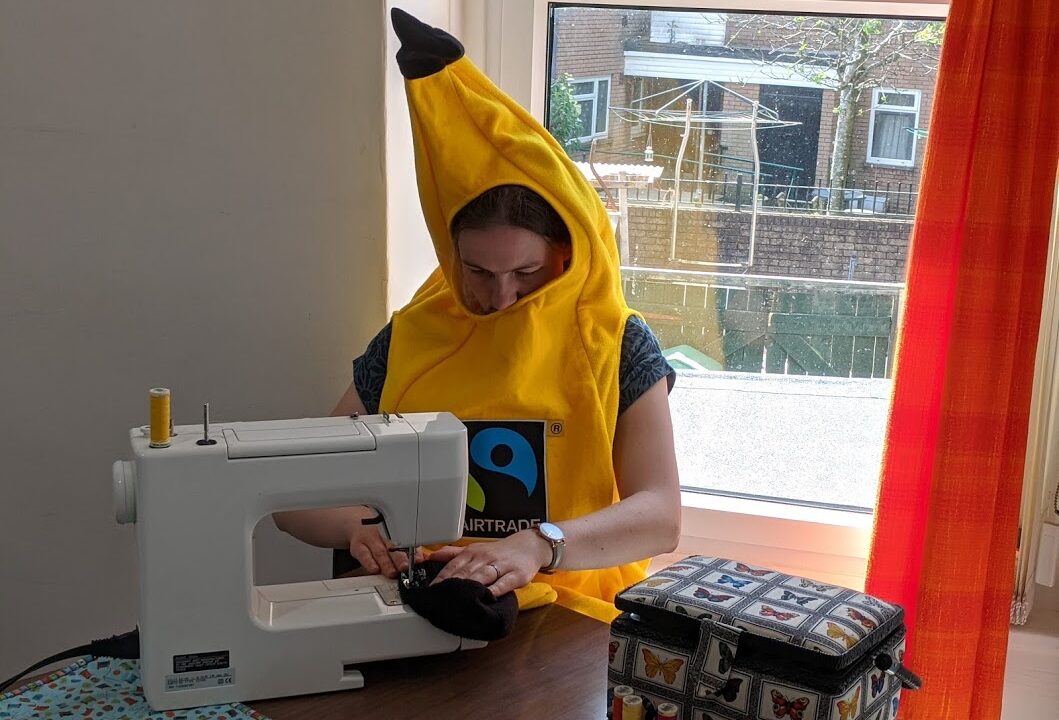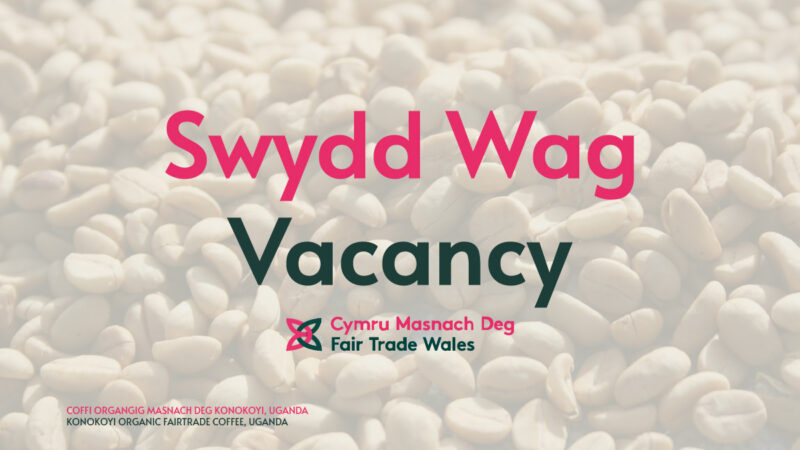Our interview with Repair Cafe Wales
October 28, 2021
This blog originally appeared on Repair Cafe Wales’s website
—
Continuing our series of interviews connecting with other organisations in Wales which share our core values of waste reduction, skill sharing and community cohesion, I was really pleased to meet Aileen Burmeister, Head of Fair Trade Wales.
Wales became a Fair Trade Nation in 2008 with a focus on supporting, growing, and promoting the Fair Trade movement in Wales. I was particularly interested in its work as I’d attended the “Coffee, Climate and the Consumer – Paned, Planed a Phrynwyr” event the previous week, when three captivating guests, including a Fair Trade coffee grower in Uganda, spoke about their relationship with coffee.
Long before “levelling up” became a political hashtag, Aileen campaigned against global inequality and studied its history and reasons why it continues to persist. After raising awareness by working in schools and for charities, Aileen started at Fair Trade Wales 6 years ago. As one of our key aims at RCW is to repair things rather than throw them away, I started by asking Aileen how Fair Trade Wales helps to reduce waste:
“The Fair Trade movement promotes waste reduction through slow supply chains such as in slow fashion. By emphasising how good quality items can last longer and can be repaired easily, waste can be reduced. The problem with fast supply chains is that overtime can be forced upon workers, who can also be hired and fired quickly to meet short term demands. We ask that consumers buy second-hand clothes when they can, but if they do buy new, that they are Fair Trade.
We support products such as Fairphone which has fairness at its core. Its ethos encompasses the whole supply chain cycle including the product’s end of life waste. The components are ethically sourced, and the metals used are conflict free; the working practices are fair; and when a part fails, such as the screen, it can be easily replaced. It is also easy to upgrade features such as the camera on the phone, rather than buy a new phone.”
At RCW we completely agree with Fair Trade’s vision. Our wonderful volunteer fixers happily try to fix items, including phones and other electricals, but all too often the repair is difficult as so many products are not made to last. Fairphone seems such a great idea and would make repairing so much easier.
Not only do our fixers try to repair broken or damages items including clothing, but they also share their skills with other fixers and members of the public who bring in their items to us. I wondered if Fair Trade Wales shared skills or knowledge as well:
“Fair Trade helps preserve artisanal crafts and skills in country such as block printing and jute weaving. At Fair Trade Wales, we support and promote the Fair Trade movement and have about 30 active groups that share knowledge and information. We meet quarterly and share ideas and look for solutions. Fair Trade Wales also collaborates with Hub Cymru Africa in training and mentoring”.
I also asked Aileen how Fair Trade Wales promotes community cohesion which RCW’s pop up sessions aim to do by inspiring and connecting local residents from different backgrounds:
“The Fair Trade community scheme is UK-wide, and we help support community groups to renew their Fair Trade status or to become Fair Trade. Our focus is very much on working together with other organisations such as councils, schools, community groups and the local press. Fair Trade groups hold talks and workshops which are interactive sessions with the local community. For example, the Fair Trade group in Bangor have a monthly market and coffee morning in a local chapel and hold an annual Fair Trade lunch, which they put on in collaboration with other organisations in the area. These are great opportunities for people to get together.”
This led me on to my final questions regarding the impact that the coronavirus pandemic and social restrictions has had on Fair Trade Wales:
“Covid has had a massive impact on Fair Trade globally. Approximately 1.7 million farmers and workers provide Fair Trade products, and their work has been restricted. Fair Trade workers are better protected than they otherwise would be as producers are paid a premium for their products, which they choose how to use as a community. Throughout the pandemic this has often been healthcare and covid protection. They also have access to a relief fund as well as a resilience fund.
In Wales we had to stop our events, stalls and speaking in schools, although some groups were able to adapt. For example, as the markets were not running, the local Fair Trade group in North Wales made deliveries instead. We also tried to keep people’s spirits up and I was photographed dressed up as a banana doing home based activities during lockdown.”
So, if you’ve been inspired, as I certainly have been, and would like to find out more about Fair Trade Wales, why not take a look at its website. Fair Trade products, including some nice ideas for Christmas, can also be bought online through Traidcraft. A recording of “Coffee, Climate and the “Consumer – Paned, Planed a Phrynwyr” event is now available.

